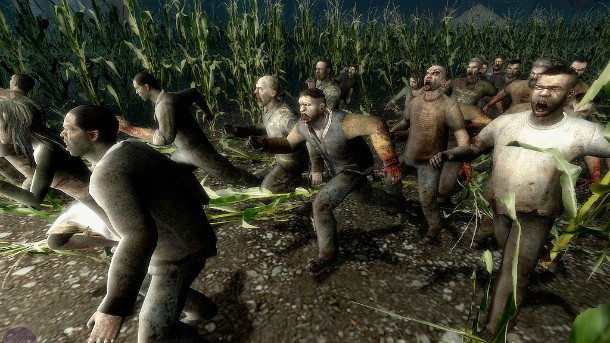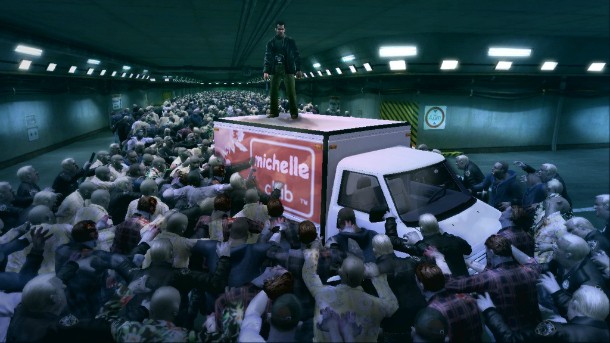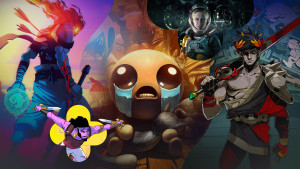Please support Game Informer. Print magazine subscriptions are less than $2 per issue
The Endless Horde: Zombie Games And Why I'll Always Love Them

I have this notebook that I used to write in as a kid filled with possible game ideas. My young brain imagined a Zelda RTS with eight factions, and a 3D platformer featuring a beaver named Reggie Crenshaw. Every so often, one of my crazy ideas would be crossed off when a real developer decided to actually create similar ideas. Last year, I finally crossed “open-world zombie RPG” off of my list. I still don’t know how the developers at Techland found my notebook, but they did. Dead Island released, I spent over 100 hours playing it, and now we’re staring down the barrel of a sequel.
Zombies are a recurring theme on my childhood list. I’ve always had a morbid fascination with George Romero’s brain children. Something about the survival aspect of a zombie apocalypse has always excited me, and the human reaction to the situation. If I were to experience something similar in real life I’m sure I wouldn’t react like I do in Left 4 Dead or Resident Evil, but my imagination always lights up when I envision myself staring down the gaping maw of a hungry flesheater.
A cursory Google search of the words “zombie video games” results in over 250 titles, and that’s excluding any sequels. The same goes for any app store searches. It seems like everywhere you look, the undead are taking over video games. We’ve probably seen everything the shambling monsters have to offer, right?
That’s where I disagree. Merely including zombies in a game doesn’t make it the same as the next. Zombies aren’t the story conceits; they’re the antagonists that give rise to a host of potential storytelling and gameplay options. The aforementioned Dead Island used zombies to add terror to a beautiful open world, giving quests and plot threads to the island’s inhabitants. I didn’t feel so much like I was playing a zombie game. Instead, the zombies provided the fuel for an immersive world full of side quests and cooperative missions.
The Walking Dead game, on the other hand, places storytelling and difficult decisions at the core of its experience. The zombie apocalypse allows player choice and morality to affect the story because every decision carries a life or death result. The fact that one of the zombies could infect a fellow survivor at any given time imparts a feeling of terror, one that isn’t present in many other zombie games.

Take Dead Rising, for instance. Capcom forgoes the traditional horror concept of a zombie apocalypse and places you in a mall where experimentation yields the best results. Macabre humor infects the entire game, wherein it’s not out of the ordinary to don a giant Servbot head and bash skulls while skateboarding. Much like the mindless zombie horde, I sometimes enjoy ignoring the logical part of my brain in favor of pursuing whatever interests me at the moment. Dead Rising allows me to do this without the lurking worries of The Walking Dead or Left 4 Dead.
Speaking of, Valve’s zombie game took cooperative fans by storm. At first glance, the zombies in Left 4 Dead were the star of the show. After playing through several chapters with three friends, however, a new focus emerges: teamwork. I began as a rookie, terrified every time I heard the escalating music that indicated an oncoming mob of enemies. My main concern became my own life, seeing as how I didn’t feel like waiting for a respawn in a distant shack while my friends had all of the fun. Eventually, we all began to realize that our team dynamic mattered much more than the actual zombies. As soon as the undead rushed us, we learned to watch each other’s backs. Backing up against a wall and alternating reloads helped us through every new area. Sharing first-aid kits and explosive weapons ensured that we survived until the next safe room. There hasn’t been a title with such an amazing cooperative experience involved since, and there likely won’t be for a while.
Somehow, among all of these triple-A games, even passion projects are based around zombies. Day Z creator Dean Hall made an Arma II mod where players are thrust into an open world with few supplies and even less direction. The most interesting aspect of the game, however, is the importance placed on survival skills. Blood transfusions and hunger management are minutiae rarely seen in other games, and the fellow players hunting you for your supplies don’t make matters any easier. The increased tension provided by permadeath sets the game even farther apart from other zombie titles. The potential loss of all your items upon death makes the entire experience more terrifying, and I hope other games embrace this risk factor.
The fact that there are so many zombie games shouldn’t raise negative concerns. Like many popular ideas, they’re probably likeable because of the potential people see in them. Gameplay formulas like those in the aforementioned games have provided us with enticing quests, progression, teamwork, and fun, but the endless zombie horde provides an environment ripe for even more unique ideas. And if a tactical turn-based game involving zombies ever gets crossed off in my notebook, I’ll die a happy man.










